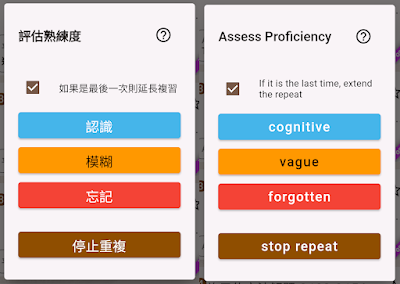English | 正體中文
如果您已經用 Consilia 的【計畫助手】安排了每日的讀書進度,結果計畫延宕了,調整各個進度是否有什麼原則?
首先,關於計畫延宕,可以參考前一篇文章裡的工具來進行調整。這裡要加強說明的是,關於調整的優先順序。如果當天的時間很緊迫,無法完成全部的進度,建議優先做複習次數比較小的。也就是標題前面有數字圓圈的任務,先做數字比較小的。
這樣的原因有二:
1. 複習次數比較小就代表距離上一次閱讀的時間比較近,在尚未遺忘之前,可以用更短的時間來快速複習。
2. 複習次數比較小就代表長期記憶不很穩固,時間拖長會忘得很快。等到忘光了再來複習,本來可以快速複習的,變成跟第一次讀一樣慢。時間壓力會一直累積,所以要趕快念。
同樣的道理,第一天的大量學習,很可能打亂並破壞接下來的所有計劃。因為要能形成穩定的長期記憶,要避免:
1. 短時間的大量複習(有用,但太花時間)
2. 遺忘後再來複習(讀書快不起來)
所以長期記憶不是只有次數而已,複習的時間點也格外重要。隔天的複習是重要而且必然的,如果第一天提前做了一週的量,結果導致隔天無法複習完第一天的進度,這對長期記憶沒幫助而且也很沒效率。
比如說,第一天用30分鐘執行一個新進度,隔天只要花6~8成以下的時間就可以複習完,也就是18~24分,這樣第二天就比較有餘裕執行第二天的新進度。
根據實驗,一般的情況,在多次的複習之後(大約四次到五次以後),所需的時間大約是第一次的一半左右(或更少)。這就是一定要在快忘記之前複習的魔法。如果不靠這種魔法來縮短讀書時間,書根本就念不完也念不熟。
如果第一天做的進度,拖到第四、第五天以後才複習,那複習時間也不會縮短太多,很可能也是30分,結果當天也有當天的進度。所需的時間如此累積起來,任何人都會被壓垮。
所以一個值得參考的優先原則是:
1. 先做複習,再做新題。
2. 先做次數小的複習,再做次數大的複習。
【一定要在快忘記之前複習】這句話,可說是貫串所有讀書備考的精隨。
If you have used Consilia's [Planning Assistant] to arrange your daily reading progress, but the plan is delayed, is there any principle for adjusting each progress?
First of all, regarding planning delays, you can refer to the tools in the previous article to make adjustments. What needs to be emphasized here is the order of priority for adjustments. If the time of the day is very short and you cannot complete all the progress, it is recommended to give priority to the ones with a relatively small number of review times. That is to say, for tasks with a numbered circle in front of the title, do the task with a smaller number first.
There are two reasons for this:
1. A smaller number of review times means that the time since the last reading is relatively close, and you can use a shorter time to quickly review before you forget it.
2. The relatively small number of review times means that the long-term memory is not very stable, and it will be forgotten quickly after a long time. Until you have forgotten all and review it again. What could have been a quick review becomes as slow as the first time reading. Time pressure will keep building up, so read early.
By the same token, a lot of learning on the first day is likely to disrupt and destroy all subsequent plans. Because to be able to form stable long-term memory, avoid:
1. A lot of reviews in a short period of time (useful, but too time-consuming)
2. Review after forgetting (you can't read fast)
So long-term memory is not just about the number of times, the timing of the review is also very important. The next day's review is important and inevitable. If you do a week's worth of work in advance on the first day, you will not be able to review the progress of the first day the next day. This will not help long-term memory and is also very inefficient.
For example, if you use 30 minutes to implement new progress on the first day, you only need to spend less than 60% to 80% of the time on the next day to complete the review, that is, 18 to 24 minutes, so that you will have more time to implement new progress in the next day.
According to the experiment, in general, after several times of reviews (about four to five times), the time required is about half (or less) of the first time. This is magic that must be reviewed before it is almost forgotten. If you don't rely on this kind of magic to shorten the reading time, you will never finish reading the books or read them well.
If the progress made on the first day is postponed until the fourth or fifth day, then the review time will not be shortened too much, it may be 30 minutes yet, and there will be other progress of the day. The amount of time required would add up in such a way that anyone would be overwhelmed.
So a priority principle worth referring to is:
1. Do the review first, and then do new questions.
2. Do a small number of review times task first, and then do a large number of review times.
[Be sure to review before forgetting] This sentence can be said to be the essence of all study preparations.





留言
張貼留言